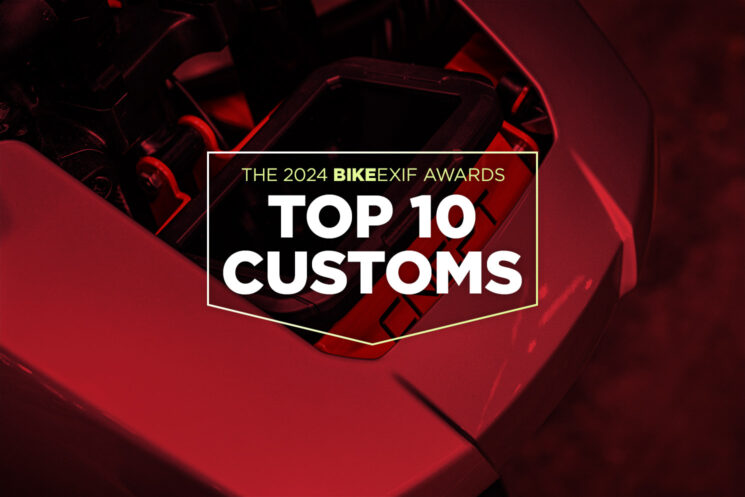
As the year barrels to a close, we’ve crunched the numbers to bring you, our dear readers, the much anticipated annual Bike EXIF Top 10.
We’ve tweaked our formula this time around. Our data was pulled from the start of December until the end of November—leaving us more time to process it, without missing any zingers that might pop up late in the year. We’ve also left social media out of it, focusing purely on the ten machines that made our servers work the hardest in 2024.
Once again, the final selection is eclectic, with no one build style dominating the charts. Grab your favorite beverage, enjoy the selection, and tell us which bikes made your 2024 hit list.
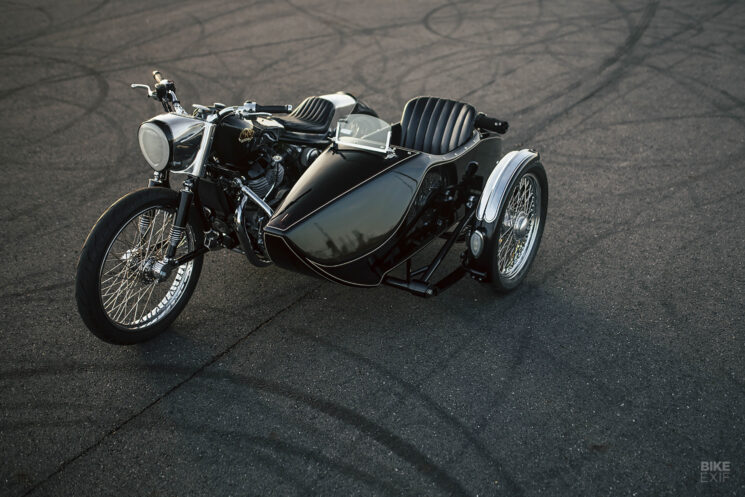
10. Royal Enfield Super Meteor 650 by Cherry’s Company You know it’s been a good year for the custom scene when our Top 10 kicks off with a Cherry’s Company machine. When master Japanese craftsman Kaichiroh Kurosu was approached by Royal Enfield to customize their recently launched Super Meteor 650, Kurosu-san pulled out all the stops. Not only does this mid-sized cruiser now sport a sidecar rig, but the bike itself wears enough mods to make it special on its own.
The mods start with a scratch-built Earles front end, sprung with KONI shocks. The Super Meteor’s frame already had the sort of sloped geometry that suited Kaichiroh’s style, but he made some subtle changes anyway—like modifying the backbone and swingarm pivot, to offset the engine and accommodate a wider rear wheel.
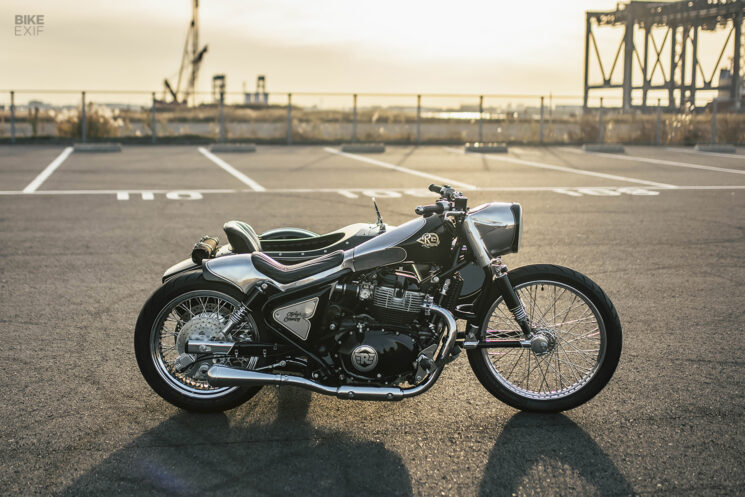
New bodywork was shaped out of steel, aluminum, and resin, showcasing Cherry’s Company’s hallmark style. The matching sidecar was made from scratch too, using fiberglass shaped over a handmade styrofoam mold. It features a leaf-spring suspension system, helped by a traditional motorcycle shock, and its own brake.
The lines of the Royal Enfield Super Meteor 650 and its sidecar complement each other perfectly, particularly with the timeless polished, black, and gold finishes. Complete with matching upholstery, this rig looks less like a custom hack, and more like a forgotten prototype from an alternate past. [More]
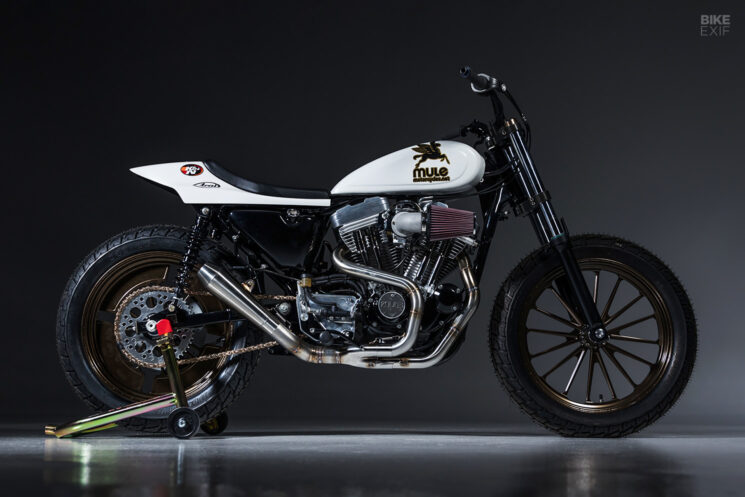
9. Harley-Davidson Sportster by Mule Motorcycles Richard ‘Mule’ Pollock treated us to a steady stream of delicious Sportster-based flat trackers and street trackers this year. So it was only inevitable that he would make it onto our list.
This white-hot 1997 Harley-Davidson Sportster 883 was built as a thoroughbred Hooligan-class flat track racer, drawing on Mule’s extensive racing and building experience. Zigging and zagging through the various Hooligan series regulations, Mule deployed his go-to set of chassis, performance, and bodywork mods.
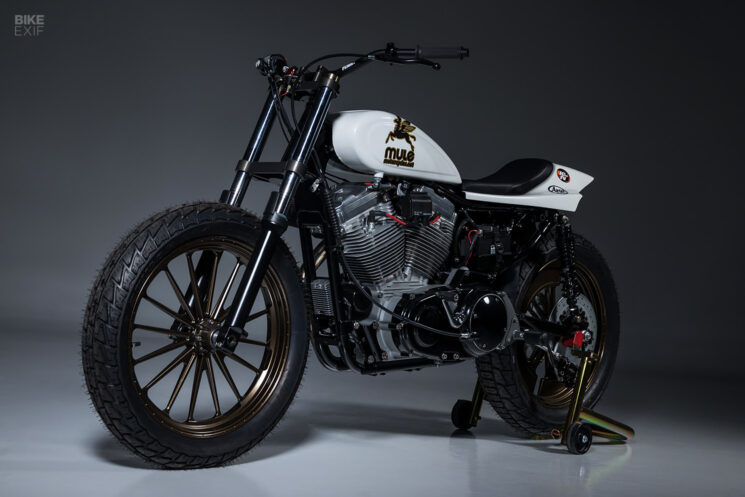
The lower rear suspension mounting points were moved forward, and connected to fully adjustable K-Tech shocks. Up front, Yamaha R6 forks were extended with cap extensions from J.J. Flairty, and matched to custom yokes and an offset steering head bearing kit. ODI handlebars sit up top, while a custom Mule foot peg and brake master cylinder bracket adorns the right-hand side of the bike.
Mule bumped the 883 mill up to 1,200 cc, threw a bunch of hop-up bits at it, and added a highly modified Cone Engineering exhaust. The rest of the build is traditional flat track fare; a Storz fuel tank, a First Klass Glass tailpiece, a Saddlemen seat, and 19” Roland Sands Design flat track wheels. The simple white livery drives the point home; this Sportster means business. [More]
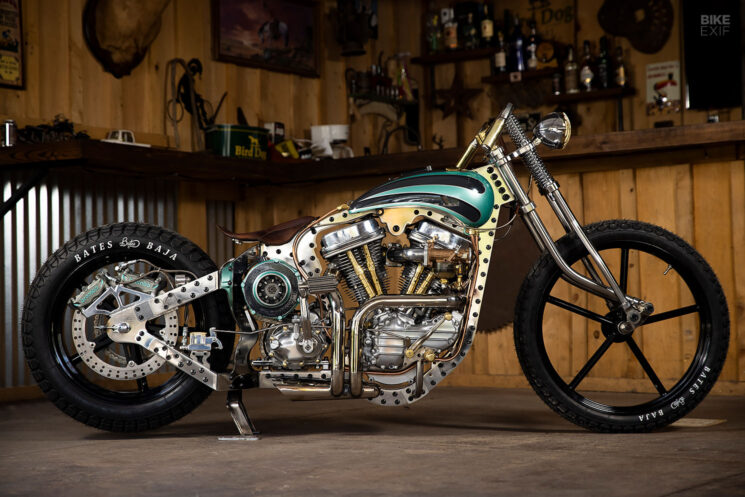
8. Harley-Davidson Panhead by Sean Jackson Run by our friends at Biltwell Inc., the Biltwell People’s Champ is an annual grassroots build-off that showcases custom builders that might otherwise fly under the radar. By its very nature, it produces some of the wildest machines on the scene.
This 1948 Harley Panhead, built by Sean Jackson, won last year’s Biltwell People’s Champ—and then melted our servers when we profiled it earlier this year. It’s easy to see why. The engine is virtually the only original part left on this Panhead, and even that’s been extensively rebuilt, courtesy of George Banks and Gary Ellis.
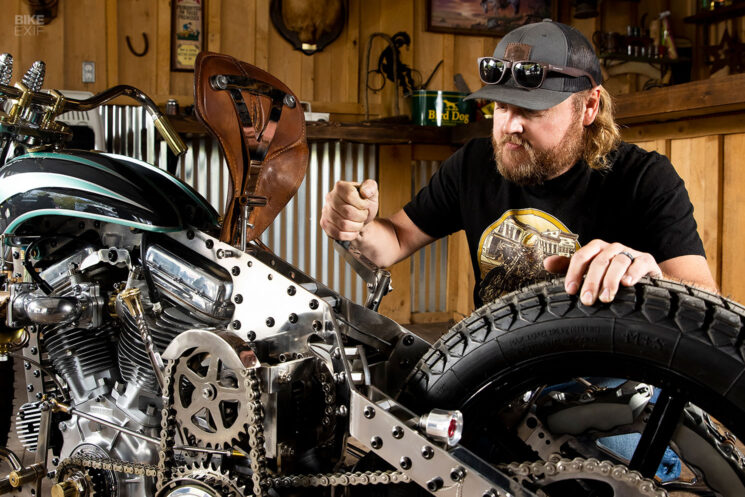
It’s now housed in a modular frame, which Sean designed in SolidWorks before piecing it together from 1/4”-thick laser-cut steel plates. The front crossover leading link forks were fabricated by hand, taking inspiration from the 1930s Harley-Davidson DAH hill climber. Led Sled Customs Invader wheels complete the rolling chassis, with twin rear Brembo brakes—one of which acts as a hill hold.
You’ll find a pair of handmade split tanks up top, and lifting the bike’s leather saddle reveals the crank handle for the bike’s unique starter. Sean retained the Panhead’s original kick starter—but he also installed a hand-crank starter from a V12 Rolls-Royce Merlin airplane engine, as used in the iconic Supermarine Spitfire. [More]
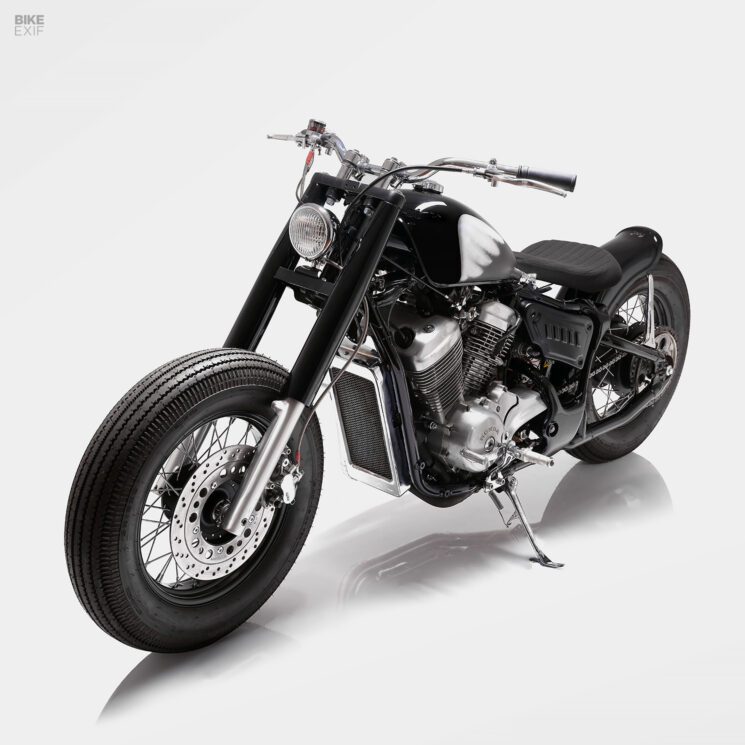
7. Honda Shadow by Frontwheel Motors Designed in the 80s, the Honda Shadow—known as the Steed in Asia—was a Japanese-made cruiser that aped the Harley-Davidson style of the day in a smaller, and cheaper, package. But in the hands of Indonesia’s Frontwheel Motors, this 1990-model Shadow (officially titled the Honda Steed VLX600 in the East) looks like a million bucks.
Remarkably, all Frontwheel had to do to prep the Honda Shadow’s frame for the bobbed style they were after, was trim off its fender struts. Taking visual cues from the 1949 Indian Model 249 Scout, they fabricated new bodywork for it—including a peanut tank, louvered side covers, and a ducktailed rear fender. A tidy solo seat was added to the mix too.
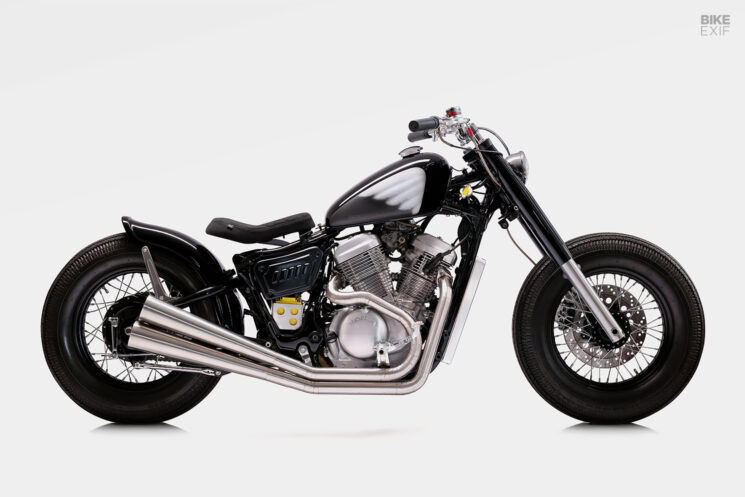
The Shadow now rolls on 16” wheels with five-inch-wide Shinko tires, while handmade fork shrouds add some visual bulk to the front end. Frontwheel also rebuilt the tired old Honda motor, and made an elegant two-into-two exhaust system.
Finishing touches include 1” bars mounted on traditional ‘dogbone’ risers, minimal controls, an appropriately tiny headlight, and a custom spray job that tips its hat to the classic Honda ‘wing’ logo. It’s seldom that we come across a custom cruiser that’s this clean—especially one that uses such a humble donor. [More]
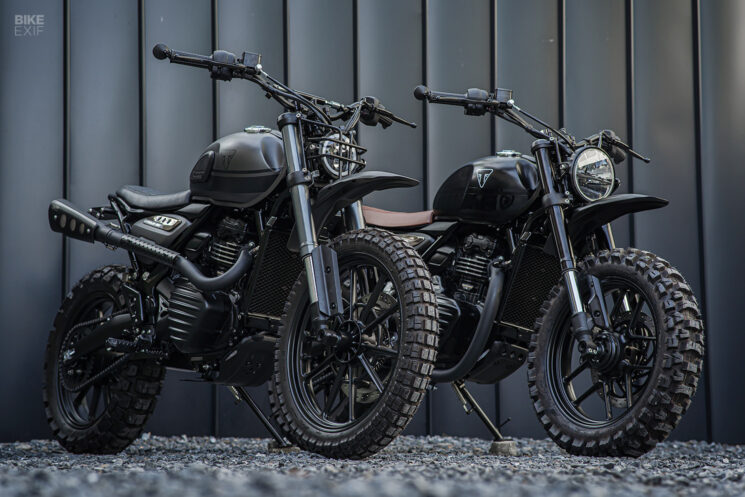
6. Triumph Scrambler 400 X and Speed 400 by K-Speed The guys at K-Speed are masters of turning small-capacity motorcycles into feisty customs, and they seldom miss. Shortly after Triumph’s new pint-sized Scrambler 400 X and Speed 400 hit the scene, the Thai outfit took one of each and worked their magic.
These bikes look pretty good in stock trim, so K-Speed focused on making judicious tweaks that would have a big impact. The Triumph Scrambler 400 X [above left] got a new subframe, an abbreviated seat, and a slim rear fender. The OEM fuel tank wears a custom strap across the top, an LED headlight inside a custom-built cage, and a handful of cockpit upgrades.
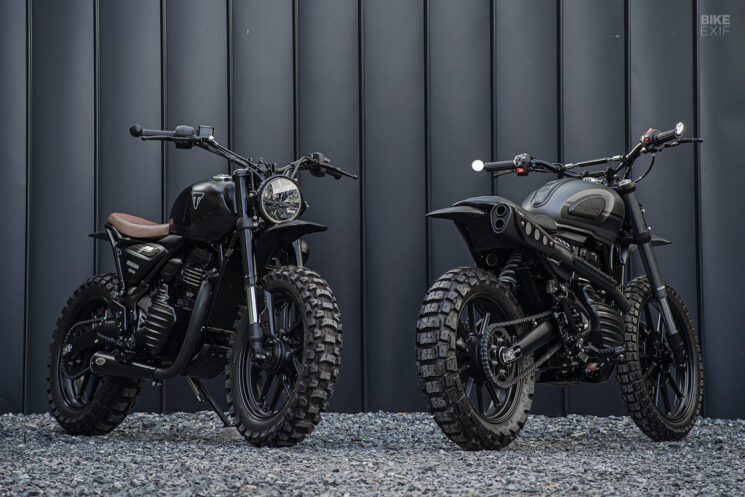
Both bikes wear ribbed engine covers, high front fenders, and brackets to relocate their speedos. K-Speed’s Triumph Speed 400 [above left] differs from their Scrambler 400 X in that its headlight is bigger (and cageless), its seat is longer, and its color scheme is different. It also employs a low-slung exhaust, unlike the high-mounted system on the Scrambler.
Even bigger than their custom operation is K-Speed’s ever-expanding range of bolt-on parts. So many of the items that they added to these single-cylinder Triumph scramblers made their way online in no time—perfect for weekend warriors who want to restyle their own Triumph 400s. [More]

5. Honda Monkey by K-Speed How often does a custom shop land in our Top 10 twice in one year? Not often. But given how prolific K-Speed is, we’re not surprised.
This sidecar-equipped Honda Monkey narrowly beat K-Speed’s custom Triumph 400s, breaking into our top five customs with oodles of charm. The brief was an odd one; K-Speed wanted a custom Honda Monkey in the shop’s signature style, that he would then send to a third party to fit a sidecar too. Once that was done, the bike had to go back to K-Speed to bring the sidecar in line with the minibike, aesthetically.
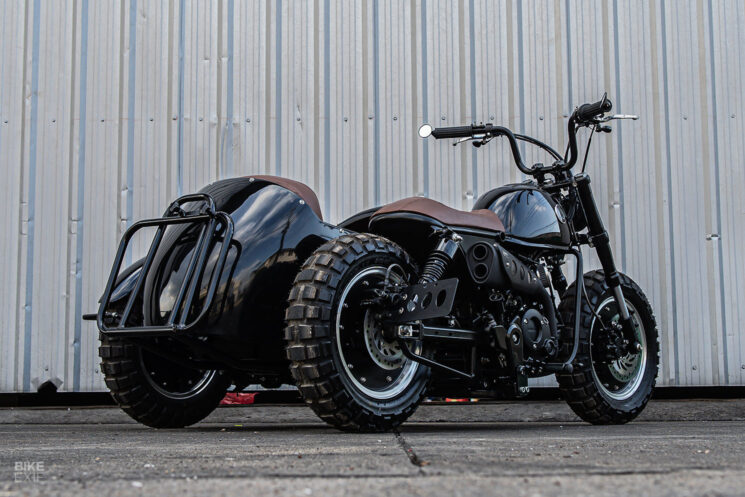
K-Speed was initially too busy to take the project on, but their client kept calling—and the shop’s founder, Eak, relented. With a previous K-Speed Monkey acting as a template, the crew began fitting parts from their burgeoning Diabolus catalog to the bike—starting with upside-down forks and a stretched swingarm.
The Monkey also received a new subframe and seat, mini-ape bars, wheel covers, and knobbly tires. Moving to the sidecar, K-speed treated it to matching upholstery and outfitted the wheel with the same cover and tire. A gloss black paint job adds a touch of timeless style to this irresistible runabout. [More]
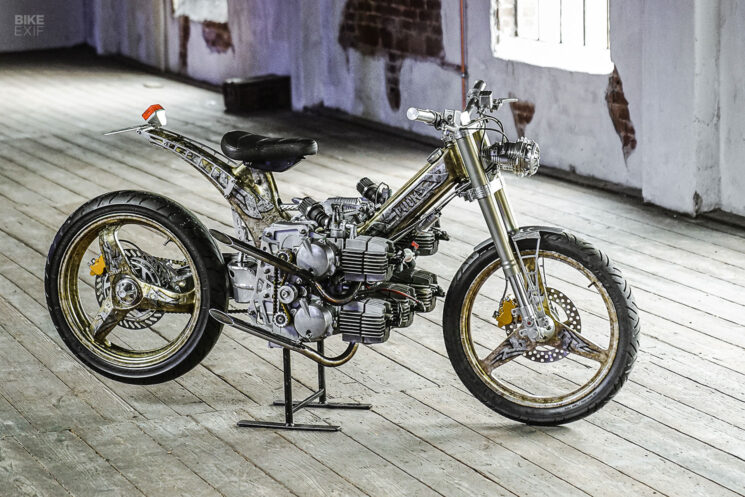
4. Five-cylinder Puch by Uwe Oltmann This outrageous multi-engined moped has the dubious distinction of being the only motorcycle on this list that’s unrideable. It’s not that it doesn’t run; it does with all five cylinders firing enthusiastically. But once you get it going, it’s far too noisy and hot to be usable.
It’s the work of Uwe Oltmann—a German toolmaker whose hobbies include building vintage car engines and messing with mopeds. This project started as a 1976 Puch Maxi S moped, to which Uwe promptly added four more Puch engines. Each engine has been bored out to 70 cc, with a central shaft linking the bottom three engines, and two belt drives connecting the fourth and fifth.
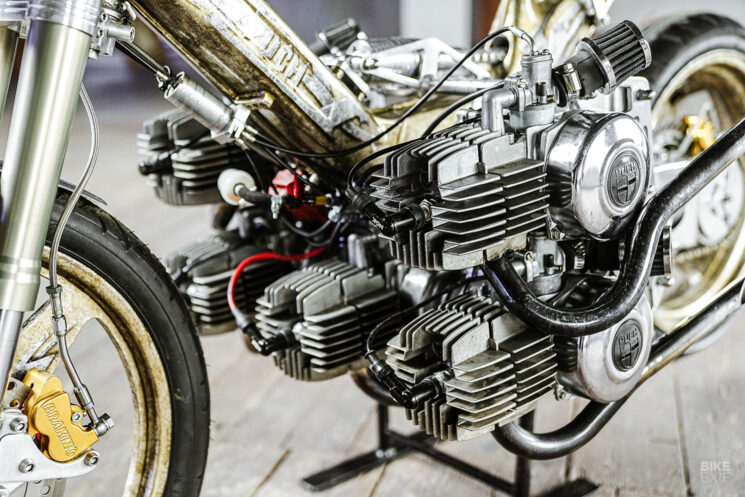
It’s not just the Puch’s five-engine design that’s special. This moped also features a prototype swingarm and a set of race-spec WP Suspension, both from Ralf Waldmann’s 1993 Aprilia RS 125 R Grand Prix racer. The front wheel uses a heavily modified moped rim, the rear wheel is a magnesium item from PVM, and bits like the headlight and subframe are one-offs.
Uwe’s creation is something to behold—especially when he fires it up. The start sequence includes spinning the rear wheel to get the first engine going, then releasing each subsequent engine’s fly clutch with a wrench. The 350 cc Puch makes 127.5 decibels at full tilt, and the only way to stop it is to pull all five spark plugs. [More]
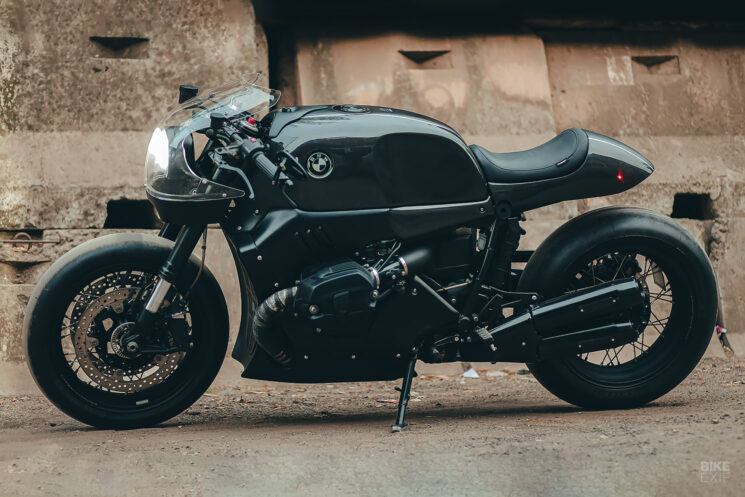
3. BMW R nineT by Smoked Garage Indonesia’s Smoked Garage had a very specific brief for this brooding BMW R nineT; “Make something Batman would ride.” They delivered in spades—skyrocketing onto this year’s podium in the process.
Smoked Garage didn’t want to compromise on the BMW’s usability, so they left the running gear alone and focused on cosmetic changes—starting with a handmade carbon fiber fuel tank and tail sections. Custom aluminum fairings adorn the bottom half of the bike, creating a silhouette that’s part racer, part brawler.
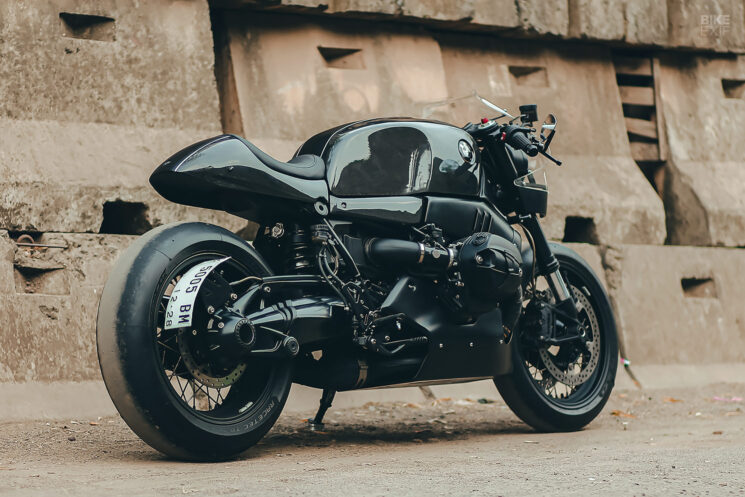
An enlarged fairing sits up front, covering a new LED headlight. Smoked also fitted clip-on bars, a handful of Motogadget components, and a fully adjustable rear shock. Finer details include tiny LED taillights, a side-stand extension, and a side-mounted license plate holder.
In true Dark Knight style, almost every part is finished in black—including the custom twin exhaust mufflers, and the BMW tank roundels. Purposeful and mean, but still thoroughly rideable (the slick tires are just for show), this gothic café racer ticks all of its owner’s boxes. [More]
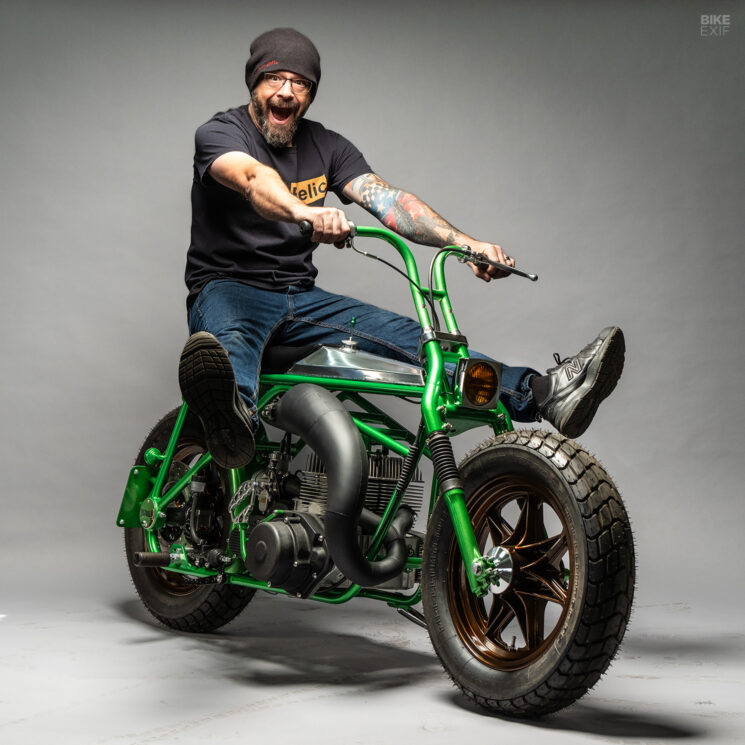
2. Custom mini-bike by MotoRelic Oddball engineering always gets our servers humming—and it doesn’t get much more oddball than an oversized mini-bike with a Yamaha snowmobile engine. Built by Sean Skinner at MotoRelic, it’s a throwback to the mini-bikes that he grew up riding.
This eccentric machine is a far cry from the 5 hp machines that Sean cut his teeth on though. He started with a 1982 Yamaha SRV 540—a two-stroke, pull-start snowmobile that makes 60 hp. Once the motor was yanked out of the sled, and the rest of it sold to recoup some of the budget, the project was underway.
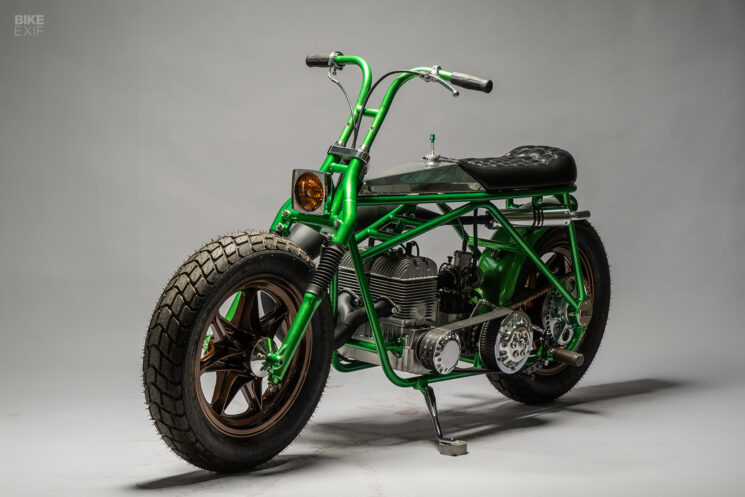
The engine underwent an extensive rebuild, and its CVT transmission was swapped for a wild custom setup, involving a Belt Drives Ltd. belt drive pulley, a custom adaptor, and a modified five-speed Harley transmission. It’s all housed in a scratch-built chromoly frame, with a Yamaha RD350 steering neck and Honda ATC200 three-wheeler forks sitting up front.
16” Henry Abe wheels are fitted with Pirelli MT60RS tires, while a Honda CB750F Super Sport brake at the back offers the only smidgen of stopping power. Just about everything else is custom—including the aluminum fuel tank, the seat, and the gnarly pull-start handle. The whole thing is, in Sean’s own words, “obnoxious on so many levels.” [More]

1. Harley-Davidson Pan America by Powerbrick Tim Somers and the team at Powerbrick burst onto the scene just over two years ago, quickly making a name for themselves with a slew of razor-sharp BMW K-series customs. So they caught us off guard earlier this year when they applied their signature aesthetic to a totally different motorcycle; the Harley-Davidson Pan America.
The Pan America might be an adventure bike at heart, but it’s proving to be a hit among custom builders. Powerbrick’s take on it is as radical as it is slick—combining clever custom parts with some of the Pan America’s distinguishing OEM features. Tim calls it “the streetfighter that Harley never released.”
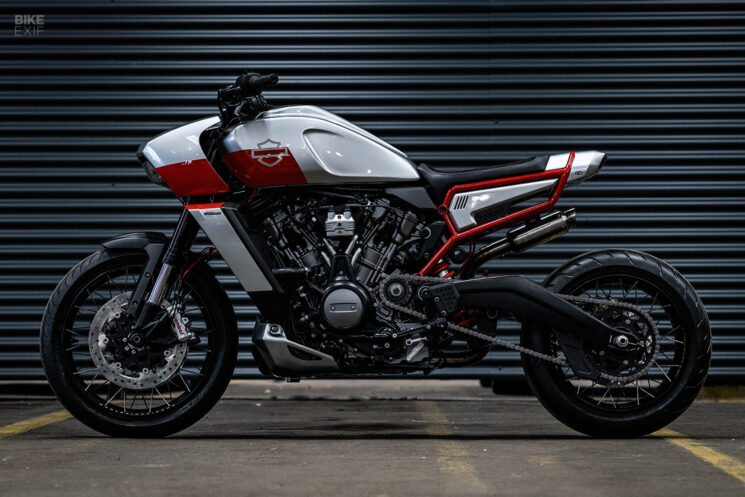
Powerbrick started by trimming the upper section of the Pan America’s distinctive ‘shark nose’ fairing—a process that necessitated relocating the bike’s TFT dashboard. Next, the big plastic strip that runs over the stock fuel tank was ditched, and the bits of the tank that hid under it were cleaned up. The rear end was treated to a more extreme makeover, with a new subframe and 3D printed body panels, courtesy of Nius Moto.
The details on this dynamic Harley could fill volumes; from the RC Racing radiator to the laced wheels, LSL handlebars, LED lighting, Noco battery, CTEK battery management system, and Venhill brake hoses. The exhaust system uses custom headers from Nius Moto with a Powerbrick muffler, and the paint job is a play on Aston Martin’s ‘Spirit Silver.’ The whole thing looks so good, it has us wondering if The Motor Co. is taking notes. [More]
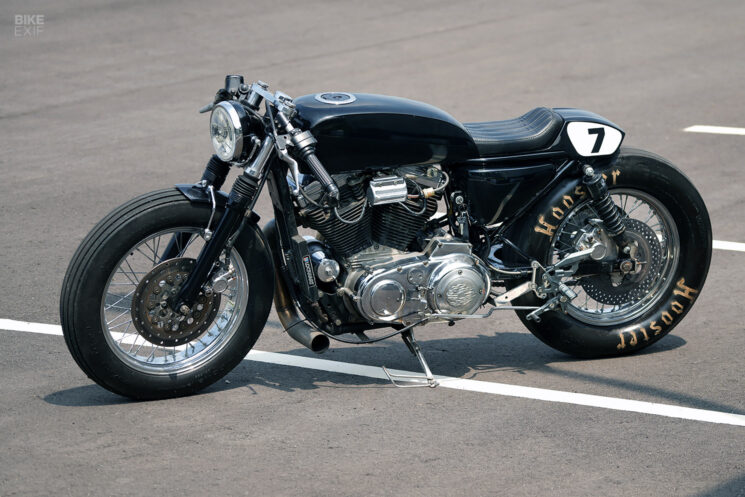
EDITOR’S NOTE The downside of crunching the numbers each year is that we end up with a handful of worthy bikes that narrowly miss the cut. Solace Motorcycle’s 1994 Sportster café racer [above], Satomari’s intricate Shovelhead, Macco Motor’s Harley XR1200, and Auto Fabrica’s neo-retro Honda Africa Twin [below] deserve an honorable mention.
Our eternal gratitude goes out to the custom motorcycle builders who keep our pages full, the photographers who capture their work in vivid detail, our team of writers, our publisher, and the advertisers who keep our lights on. Happy holidays, and be sure to check back in just before the new year, when we present our personal favorites from 2024—data be damned.
